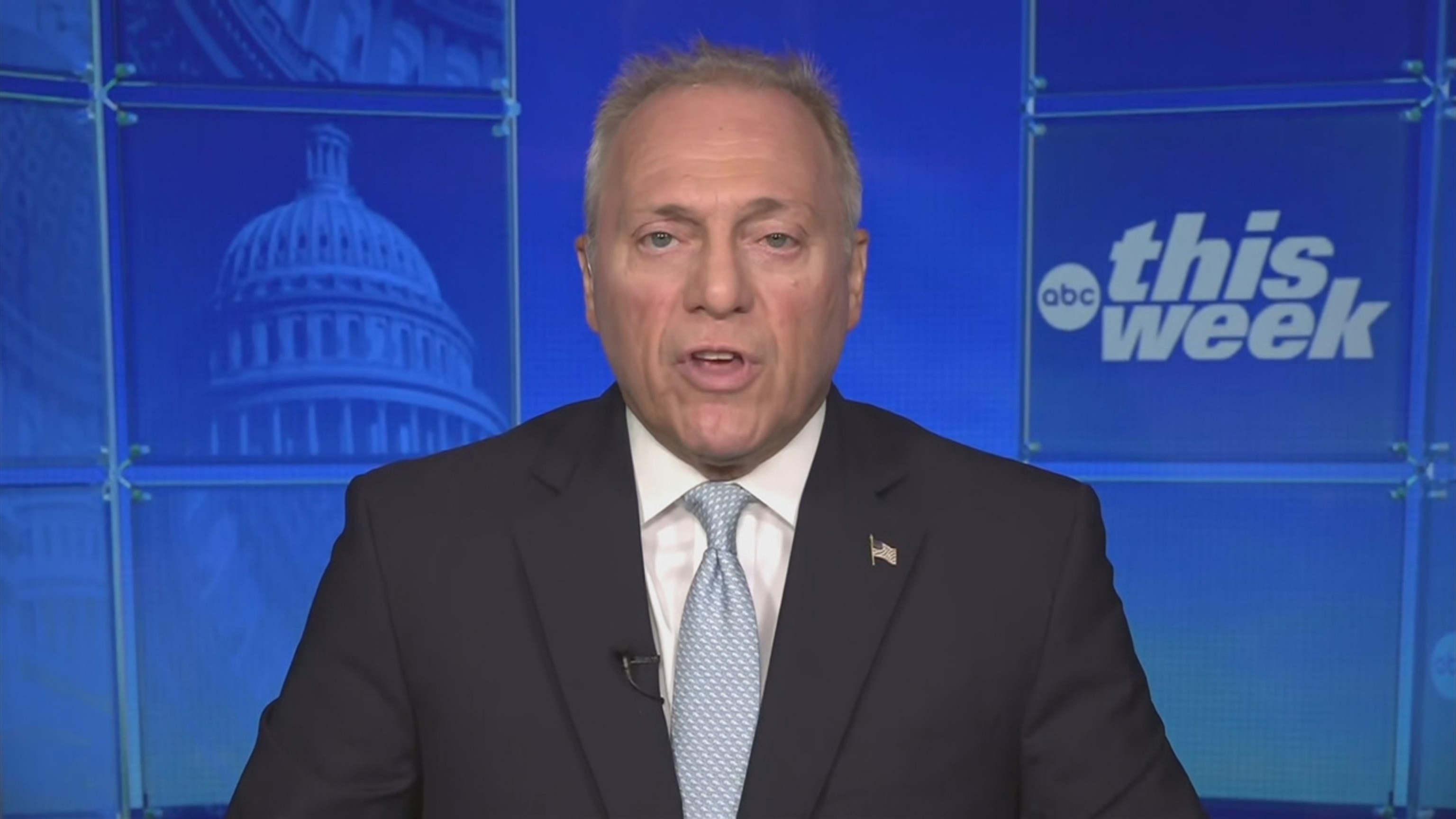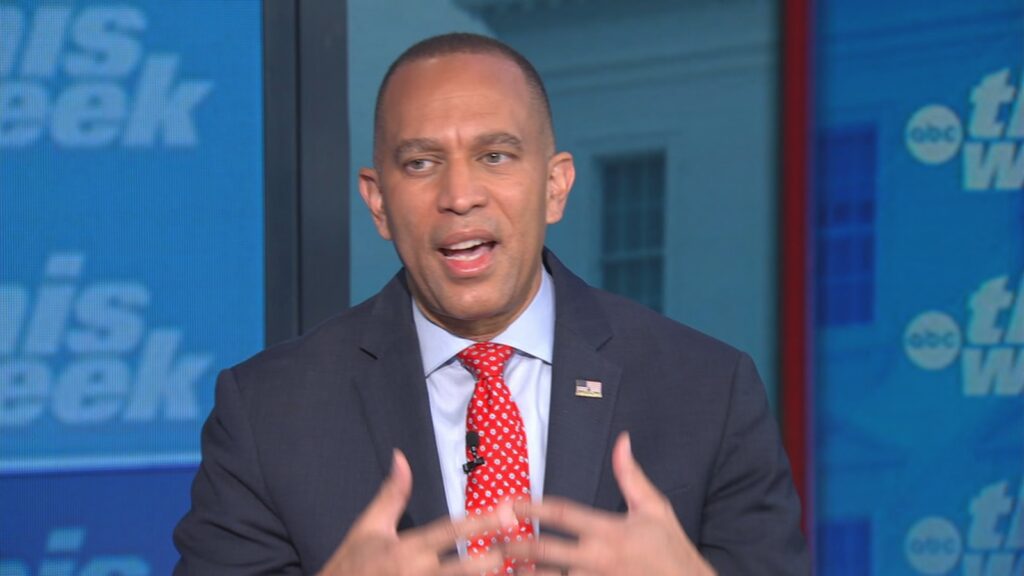House Minority Leader Hakeem Jeffries said Sunday he is “hopeful” a government shutdown can be avoided as Congress lurches toward its Tuesday deadline to reach a spending agreement.
Jeffries’ comments come after President Donald Trump canceled a meeting last week with Jeffries and Senate Democratic leader Chuck Schumer to hammer out a deal before saying Saturday he’d meet with the Democrats and Senate Majority Leader John Thune and House Speaker Mike Johnson on Monday.
“Our view going into the meeting is that we want to find bipartisan common ground, to find a spending agreement that avoids a government shutdown and actually meets the needs of the American people in terms of their health, their safety, and their economic well-being,” Jeffries told “This Week” co-anchor Martha Raddatz.
One of the main points of contention between Democrats and Republicans has been the impending expiration of some of the Affordable Care Act’s tax credits, which Democrats are fighting to extend.
House Minority Leader Hakeem Jeffries appears on ABC News’ “This Week” on Sept. 28, 2025.
ABC News
“We know they don’t expire till the end of the year, so why not approve this and just get seven more weeks to negotiate?” Raddatz asked.
“Well, because notices are going to go out in a matter of days and it’s going to be a shock to the system of everyday Americans who are already struggling to get by,” Jeffries said. “And the challenge that we have in this particular instance is that several times over the last few months, Republicans in the House have had the opportunity to vote with Democrats to extend the Affordable Care Act tax credits. And they’ve repeatedly and consistently declined to do it.”
Responding to Jeffries later on “This Week,” House Majority Leader Steve Scalise advocated for passing a short-term funding bill to prevent a shutdown and continuing negotiations into the coming months.
“Let’s let those talks continue till November with this short-term government funding bill that’s in the Senate,” Scalise said. “But it’s the same levels of funding that the Senate voted for, Democrats included, back in March.”

House Majority Leader Steve Scalise appears on ABC News’ “This Week” on Sept. 28, 2025.
ABC News
Scalise noted that he, like Jeffries, is hopeful that a shutdown can be avoided.
“I’m not only hopeful, I, Speaker Johnson, all my Republican colleagues voted to prevent a government shutdown, and we passed that bill to the Senate,” Scalise said.
“There’s still time for an agreement to be reached. I’m glad that President Trump is showing leadership and meeting with all leaders, Republican and Democrat, Monday in the White House, but ultimately, those Democrats have to make a decision.” he added.
Here are more highlights from Jeffries’ interview:
On upcoming negotiations with Trump
Jeffries: They did not explain why [last week’s meeting] was canceled, other than the statement that Donald Trump issued that mischaracterized the Democratic position. Our position has been very clear: Cancel the cuts, lower the costs, save health care so we can address the issues that really matter to the American people.
Our view going into the meeting is that we want to find bipartisan common ground, to find a spending agreement that avoids a government shutdown and actually meets the needs of the American people in terms of their health, their safety, and their economic well-being.
On the impact of a shutdown
Raddatz: I want to play what — play what you were saying back in December after then-President-elect Trump came out against the bill Congress was working to pass to keep the government open. This is what you said would be the result of a shutdown.
Jeffries on Dec. 19, 2024: Families will be hurt. Farmers will be hurt. Border security and border patrol agents will not be paid. TSA agents will not be paid. Small businesses will be hurt in every single community.
Raddatz: And this time, the threat of mass firings basically and telling people they may not be able to come back to work at all.So, do you still believe a shutdown would broadly hurt the American people?
Jeffries: We are always of the view that we need to fund the government and make sure that the services that the American people rely upon can continue to be received. And also that we stand by our federal civil service. We’ve seen since January 20th mass firings already taking place by the Trump administration in the absence of government shutdown, because this is what they determined to do, hurt every day Americans.
Here are more highlights from Scalise’s interview:
On the administration’s threat to fire federal workers
Raddatz: And the administration has threatened these mass firings of federal employees. What would that look like? And is that something you — you support?
Scalise: Well, I haven’t seen the full details. But if you go back to Covid, Martha, President Biden dramatically expanded, mushroomed the size of the federal government, supposedly to deal with Covid. Well, Covid is over, and yet many of those federal agencies are still 20 or 30% larger than they were before Covid. And so there’s been a need for a rightsizing of the federal government for a long time.
President Trump’s talked about that with DOGE and other things he’s doing to try to save waste, fraud and abuse in government. And I think everybody knows there are billions, and tens of billions of dollars in waste, fraud and abuse that still needs to be rooted out. We got to some of that, but there’s more that needs to be done.
On the James Comey indictment
Raddatz: Let me read you what your fellow Republican caucus member, Representative Don Bacon, wrote in response to the indictment: “Lawfare undermines our great country. It didn’t start in January, but it didn’t end either. The continued escalation will only hurt us all.”
Your response to that?
Scalise: Well, we saw an unbelievable abuse of power from federal agencies for years and years. And, frankly, James Comey is one of the main culprits in undermining the public’s trust in agencies like the FBI. He abused his power, Martha. And now, ultimately, he has been indicted for lying to Congress. This isn’t about what he did to the president. It’s about lying to Congress and obstructing justice, and that’s what he was indicted for. He’s going to ultimately go before a jury of his peers. So he gets to make his case, but there’s serious charges.

